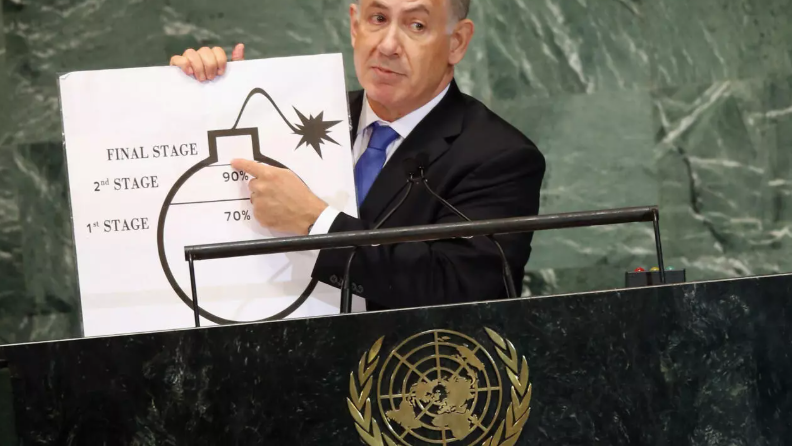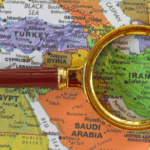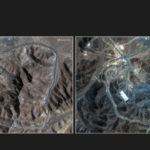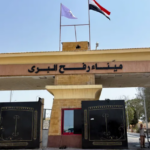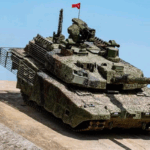In September 2012, Israeli Prime Minister Benjamin Netanyahu took the world stage at the United Nations General Assembly, brandishing a cartoon-like bomb diagram with a dramatic red line across its top. His message was stark:
“By next spring, at most by next summer… Iran will have enough enriched uranium for the first bomb.”
The global media ran with his warning. The image became iconic. The world braced itself for a crisis that — like so many of Netanyahu’s warnings about Iran — never came.
A Decade of “Weeks Away”
Since 2012, Netanyahu has issued the same alarmist claim again and again, shifting the timeline but not the substance. Let’s track his words:
- 2013:
“They haven’t crossed the red line I drew at the UN, but they’re getting closer.”
- 2015 (U.S. Congress speech):
“This deal won’t block Iran’s path to the bomb. It paves Iran’s path to the bomb.”
- 2018 (Iran’s so-called nuclear archive):
“Iran lied… 100,000 secret files prove Iran is brazenly lying when it says it never had a nuclear weapons program.”
- 2020:
“Iran is moving forward, dangerously, with its nuclear weapons program.”
- 2021:
“Iran is much closer to a bomb than when I took office, and the threat is grave.”
- 2023:
“Iran is galloping toward the bomb, and the world must wake up before it’s too late.”
In nearly every major speech and media appearance, Netanyahu insisted that Iran was “weeks or months” away from a nuclear weapon. Yet, the bomb never came.
Opposing Diplomacy, Fueling the Crisis
Even as Netanyahu issued these dire warnings, he actively undermined the diplomatic efforts aimed at preventing an Iranian bomb. When the world’s major powers negotiated the Joint Comprehensive Plan of Action (JCPOA) in 2015 — an agreement that imposed strict limits on Iran’s enrichment and subjected its program to unprecedented inspections — Netanyahu denounced it as a “historic mistake.”
“This deal doesn’t prevent Iran from getting nuclear weapons. It paves Iran’s path to nuclear weapons,”
he declared, doing everything in his power to persuade the U.S. to abandon the agreement.
When President Trump withdrew from the JCPOA in 2018, at Netanyahu’s urging, Iran’s enrichment accelerated — just as experts had warned.
Why Attack Now?
If Iran was “weeks away” in 2012, why didn’t Netanyahu strike then? Why not in 2013, 2015, or 2018? Why choose this moment, after years of similar claims, to bomb Iran?
The answer lies less in any sudden change in Iran’s capabilities — which have grown in part because diplomacy was destroyed — and more in Netanyahu’s political calculus.
At home, Netanyahu faces unprecedented challenges: corruption charges, mass protests against his judicial overhaul, divisions within his own coalition, and growing discontent within Israel’s security establishment. His political survival is at stake.
But perhaps even more decisive is the worsening global perception of Israel. Since October 7, in the aftermath of Hamas’s horrific attacks, Israel’s response in Gaza has shocked the world. With tens of thousands of civilians killed, entire neighborhoods razed, and reports of famine and disease spreading through the devastated strip, Israel’s actions have been widely condemned as war crimes — and in some quarters, as genocide.
The moral standing that Israel once enjoyed in much of the Western world has eroded rapidly. Mass protests fill the streets of European and North American cities. Human rights organizations speak in increasingly harsh terms. Even Israel’s staunchest allies, including segments of U.S. and European governments, now question the path Netanyahu has chosen.
It is in this context that Netanyahu’s decision to bomb Iran must be understood. By launching attacks on Tehran — framed, as always, as a strike against a regime on the brink of nuclear weapons — Netanyahu seeks to recast Israel’s image in the eyes of the West. No longer the aggressor laying waste to Gaza, Israel becomes the stalwart defender of civilization, standing between the free world and a nuclear-armed tyranny.
The timing is no accident. Netanyahu hopes that by reigniting the familiar specter of an Iranian nuclear threat, he can deflect international outrage, regain Western public sympathy, and reestablish Israel’s moral authority — at least in the eyes of those governments and publics growing uneasy with the Gaza catastrophe.
In short, the attack on Iran serves not only military aims, but public relations ones. It is designed to bury the images of starving children in Gaza beneath the headlines of a new regional war, and to offer Western governments a reason — however flimsy — to rally once again behind Israel.
Crying Wolf — and the Cost
For over a decade, Netanyahu has wielded the specter of an Iranian nuclear bomb as a political weapon — both to rally domestic support and to secure unquestioning backing from Western allies. Again and again, he presented the world with what he called an imminent apocalypse: Iran was on the verge of acquiring nuclear weapons; Israel stood alone as the last line of defense.
But each time, the catastrophic scenario he invoked failed to materialize. The bomb never came. Iran’s leaders, despite their bluster and dangerous ambitions, stopped short of crossing the nuclear threshold. And crucially, when the world put forward negotiated solutions — above all, the Joint Comprehensive Plan of Action (JCPOA) — Netanyahu not only rejected them, he actively worked to destroy them.
His refusal to support, or even tolerate, diplomacy contributed directly to the perilous situation the region faces today. By undermining the JCPOA, Netanyahu helped dismantle the very mechanisms that kept Iran’s nuclear program in check. The deal had slashed Iran’s stockpile of enriched uranium, capped its enrichment levels far below weapons-grade, and subjected its facilities to the most intrusive inspections regime in history. With that framework shattered, Iran resumed enrichment, increased its stockpile, and reduced international access and oversight.
In effect, Netanyahu’s own policies have produced the scenario he long claimed to fear: an Iran with greater enrichment capacity, minimal supervision, and far more bargaining power.
And what is the result of this long game of crying wolf? A world less willing to trust Israeli intelligence assessments. Allies who have grown weary of Netanyahu’s endless alarms. A region now teetering on the edge of a full-scale war that could have been avoided through honest engagement and sustained diplomacy.
Now, with diplomacy dead, Netanyahu acts — not out of necessity, but out of desperation. His strategy of rejection and alarmism has left him with no options but military escalation. But far from making Israel safer, this escalation risks dragging the region into chaos. It threatens to create exactly the kind of nightmare — of a destabilized, nuclear-armed Middle East — that Netanyahu once warned about.
The ultimate cost of Netanyahu’s long game of fear is that it has boxed Israel, and perhaps the entire world, into a corner where war becomes the only remaining tool — a tool wielded not to solve problems, but to mask the failures of the past.
A Tragic Irony
The ultimate irony of Netanyahu’s long campaign against Iran is this: the most successful effort ever undertaken to prevent an Iranian bomb — the Joint Comprehensive Plan of Action (JCPOA) — was not destroyed by Tehran, nor by rogue actors, nor by some failure of diplomacy. It was sabotaged by the very leader who claimed, louder than any other, that preventing an Iranian nuclear weapon was his highest priority.
The JCPOA was not a perfect deal. No agreement forged between adversaries ever is. But it achieved what decades of threats and sanctions had not: it froze Iran’s nuclear program, rolled back its enrichment, eliminated most of its stockpile, disabled its plutonium reactor, and subjected its facilities to unprecedented international inspections. It bought time, created space for dialogue, and reduced the risk of war.
Yet Netanyahu rejected this historic achievement outright. He called it a “historic mistake,” lobbied furiously to destroy it, and ultimately convinced the Trump administration to abandon it. The predictable result? Iran resumed enrichment, expanded its nuclear activities, and accelerated its march toward the very capabilities Netanyahu claimed to fear most.
This is the tragedy of Netanyahu’s approach: the destruction of diplomacy not only brought no security to Israel — it deepened the dangers the region now faces. His strategy of relentless alarmism and rejectionism left no room for negotiation, no path to stability, and no exit from perpetual confrontation.
And now, as his political fortunes crumble at home — amid corruption charges, protests, and growing global condemnation of Israel’s conduct in Gaza — Netanyahu turns to war as his last refuge.
Is this military campaign truly about stopping an Iranian nuclear weapon — or about salvaging Netanyahu’s own power after years of failed policies, broken promises, and missed opportunities?
Is this about defending Israel — or defending a prime minister who has led his nation into deeper isolation, greater peril, and moral decline?

